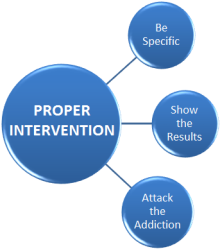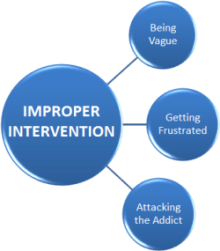My Friend Needs Help (Part 3): Confronting the Addict
Now it’s time to apply what we learned from parts one and two!
 Once you understand and unconditionally love your addicted loved one, it’s time to combine what you know— it’s time to intervene. Intervention (or confrontation) is your most powerful tool as you help your loved one seek treatment.
Once you understand and unconditionally love your addicted loved one, it’s time to combine what you know— it’s time to intervene. Intervention (or confrontation) is your most powerful tool as you help your loved one seek treatment.
80% of interventions produce positive results. But in order to properly confront your addicted loved one, you need to keep a few principles in mind:
- Know what you’re doing: An intervention is an organized expression of honest concern for someone struggling with drugs or alcohol.
- Know what/who you’re dealing with: Proper diagnosis is essential… you need to understand the addict and his addiction!
- Plan, Plan and Plan! You need to have a plan before you confront the addict.
- Confront with love and care: Don't win the battle and lose the war. Getting angry during an intervention can mess everything up. Good planning will prevent anger.
How do I Intervene??
Before you consider posing an intervention, you need to know what you're trying to accomplish. The goal of every intervention is to show the addict the effects of his addiction in a receivable way.
And the realities of addiction fall under two broad categories: The effects on the addict, and the effects on people associated with the addict (mainly loved ones).
What you should ALWAYS do during an intervention:
- Present the specific facts of the addiction: This will objectively open the addict's eyes to his problem.
- Show what has happened as a result of the facts: This will show the addict what he is really doing.
- Compel the person to face the facts of the addiction: In order for the addict to ever recover, he must face his addiction head-on.
- Attack the addiction, not the addict: Be empathetic. Show the addict how much you love him by taking part in his addiction—not just sympathizing with him.
What you should NEVER do during an intervention:
- Beating around the bush, and talking vaguely about the addiction: This will allow the addict to further justify his problem. If you aren't specific in dealing with the problem, the addict won't be specific either.
- Verbally clobbering the addict: It's very easy to get frustrated during an intervention; you can prevent this by planning well.
- Attacking the addict, not the addiction: You're attacking the victim's walls of defense, not the victim himself.
Before the Intervention
You need to plan your intervention, and here are three basic steps that can guide you towards a success.
1. Put together a team
Start by making a list of people the addict has a meaningful relationship with. Don't include other addicts in the list. You'll find it helpful to include:
- Their spouse and other family members (children/ parents)
- Their employer or other co-workers
- Close friends and neighbors
2. Research and get Specific
Look into treatment options in your area. If the intervention goes well, you should make recommendations during it. If you don't have a plan for what follows the intervention, the addict will probably relapse.
Make a written list of things the addict does to you or other people that are cause for concern. Being specific while writing here is very important.
Don't simply write, "You drink too much." Instead write, "Last week you spent our food money on your addiction," or "On Friday, you promised you'd be home by 7pm, but you staggered into the house at 11pm; I was very concerned."
3. Rehearse the Intervention
Rehearsing the intervention before you actually conduct it is helpful for a couple reasons.
- First, it shows family and friends that they aren't alone in their struggle with the addict.
- Second, it can help build mental and moral support from each other.
- Third, it can clarify your purpose and reduce tension during the actual intervention.
Intervening| Interrupting Addiction
 If you’ve completed steps one-three, you’re probably ready to confront your addicted loved one. It’s time to act!
If you’ve completed steps one-three, you’re probably ready to confront your addicted loved one. It’s time to act!
You’ve made the effort:
- You understand the addict and his addiction.
- You love the addict unconditionally.
- And you have a team ready to pose an intervention that you’ve rehearsed.
You are ready to help!! So do so, and confront the addict confidently—knowing you’ve done all you can to help.
Deaddictioncentres.IN is a resource, a rehab directory, and an addict’s guide to recovery—we hope you are able to help your loved one.
If you have any questions or comments, please leave them below.












